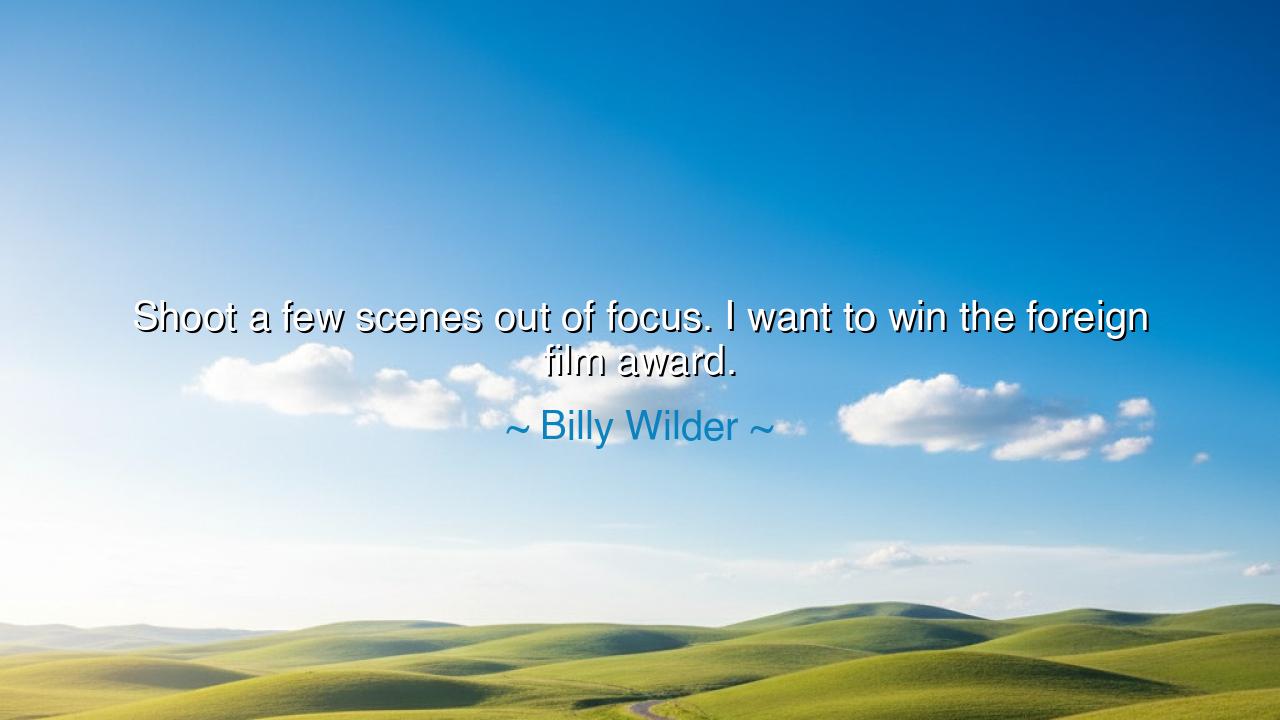
Shoot a few scenes out of focus. I want to win the foreign film






Billy Wilder, master of wit and architect of timeless cinema, once jested: “Shoot a few scenes out of focus. I want to win the foreign film award.” At first these words sound like a quip, a playful barb at the mysteries of artistic prestige. Yet within them lies a profound truth about art, perception, and the strange ways the world often measures greatness. Wilder knew that genius alone does not always guarantee recognition; that fashion, novelty, and even imperfection sometimes hold greater sway in the eyes of judges than clarity and truth.
The ancients themselves knew the power of irony to reveal wisdom. In the words of Diogenes the Cynic, who mocked the empty pomp of Athens with laughter and ridicule, we see the same spirit as Wilder’s. For Wilder, by joking about blurred focus, was pointing not merely to cameras but to human judgment — how often we reward what is obscure simply because it is obscure, how often we honor what is difficult to see rather than what is clear. His jest exposes the vanity of awards and the fleeting nature of acclaim.
History too gives us examples of this paradox. Consider Vincent van Gogh, who in his lifetime was dismissed and ridiculed, his brushstrokes seen as crude, his visions as strange. Yet the very qualities that made him ignored in his day became the marks of his immortality. The blurred focus of his art — not literal, but emotional, impressionistic, dreamlike — now draws reverence from millions. Wilder’s humor echoes this: the strange and the unclear often seduce the eye of posterity more than the polished and the precise.
Yet there is another layer to Wilder’s words. He was, after all, a man who believed that cinema should entertain as much as it should inspire. His films, sharp in dialogue and deft in storytelling, stood apart from those who cloaked weakness in obscurity. By mocking the foreign film award, he was reminding his disciples that the true measure of art is not the prize it wins, but the hearts it moves. A blurred scene may win a judge’s favor, but a story told with soul will win eternity.
The teaching, then, is this: do not chase approval by clouding your truth. Do not strive for recognition through tricks and fashions. Speak clearly, act sincerely, create honestly. If your work wins awards, let it be because it shines, not because it hides in mist. Remember that applause fades, but truth remains. Wilder’s laughter is a warning: those who sacrifice clarity for acclaim will gain only a crown of smoke.
Practical action flows from this wisdom. In your own life, do not seek to impress by being vague or difficult for its own sake. When you speak, let your words carry meaning; when you create, let your work reflect your deepest truth. Laugh at the vanities of the world, as Wilder laughed, but do not surrender to them. Share your vision with clarity, and trust that even if awards pass you by, the memory of your sincerity will endure in the lives you touch.
So remember, O seekers of greatness: the world may at times reward the out of focus, the obscure, the fashionable. But the true artist, the true leader, the true soul, will never sacrifice substance for shadows. Follow Wilder’s example — laugh at the vanity of honors, but never betray the clarity of your craft. For in the end, it is not the foreign film award that grants immortality, but the truth you leave behind, shining through every frame of your life.






AAdministratorAdministrator
Welcome, honored guests. Please leave a comment, we will respond soon